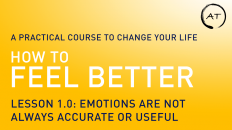When you first hear that emotions may not be accurate, it can be jarring. But overreactions are an accessible example that will make you feel more comfortable about inaccurate emotions.
So, what is an overreaction? It’s a strong emotional reaction to something small.
Say I’m at parent’s house for dinner. Everything is wonderful, until my mother says, “Your pants are rumpled.” I reply, “SHUT UP!” My mother just made a simple statement, yet I yelled at her.
My emotional response is clearly inappropriate. There is an obvious mismatch between reality and my emotion.
Maybe my mother was going to offer to iron my pants. Maybe she was joking. Maybe she was just being a mother.
Whatever her reason, my overreaction is not accurate and is not useful for me. I’ve set my mom in worse mood at no benefit to myself. It’s clear that my yelling is not a response to reality and is inappropriate.
Overreaction is a great term. Overreactions are responses above what a situation calls for.
From here, it’s clear that some of our emotions are not appropriate. But there more ways our emotions can be inaccurate than just overreactions.
Emotions can be inappropriate when they do one or all of the following:


